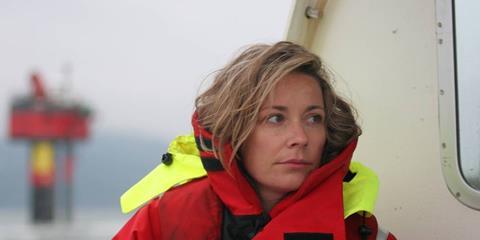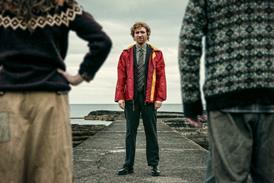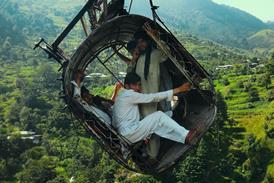The director of Third Star, which the Closing Night Gala at EIFF, talks about her experiences of shooting the low-budget film in a remote part of Wales and how she set out to confound genre expectations.

Third Star may be about terminal illness but it is also intended to be raucous and funny. “It’s a cancer comedy,” the director quips. “That’s a whole new genre. Just look out for it.” The film follows three men who accompany their terminally ill friend to an isolated beauty spot, Barafundle Bay on the Pembrokeshire coast.
Dalton (a former editor) won the BAFTA for Best Short Film for The Banker in 2005. Her 2009 short One Of These Days, starring Derek Jacobi, had financing from the BBC and Elton John’s Rocket Pictures.
What attracted you to Vaughan Sivell’s screenplay?
We had a common agent. He had seen my short films and I think he saw something in them that struck a chord. When I read his script, it struck a similar chord. I like films that are about something big but that have access to comedy. The relationship between the boys, the male friendship and the enormity of the drama of it because of one of them having cancer all appealed to me. Every part of their journey is amplified because of that. Everything is more poignant and short cuts to the real emotions.
As a woman, how easy was it to make a film about such intimate male friendship?
It might have been less interesting for me if it had been about four women. Women are more in touch with their emotions and more able to express those emotions. What I thought was interesting was to capture what was not said and how these males were with each other in body language and how they looked at each other - all of that stuff which speaks volumes in male relationships.
You have a strong cast with JJ Field, Benedict Cumberbatch and others. How easy was it to attract them?
Just about everybody who read it wanted to do it which is testament to the strong material. In the casting, it was important to have really strong actors. For me, it was essential that I could believe in them as a group, playing these four friends who’ve been friends for years. It was probably more difficult for them as actors on the shoot than the journey of the actual boys in the story! It was a tough, tough shoot - all exteriors and a really short time, with long, hard days but they really mucked in. They encapsulated those characters and were in character most of the time.A lot of the men who’ve seen the film (I am glad to say) have said believe it. That was one of the main goals. The other was to strike the emotional chord without being mawkish. I wanted it to be real and as authentic as possible. I think people do deal with hardship with comedy just to get by. Also, audiences have access then not to be dragged down and not want to slit their wrists.
They can enjoy something and be entertained and have the points of relief so you can take on the heavy stuff.
Was it easy to convince the financiers?
It’s not easy particularly in this climate. Right when we wanted to make it, there was the economic downturn all over the world. Kelly (the producer) and I had worked together on our short films. On The Banker, which we made with Michael Sheen, no-one gave us support and we tried. We just bit the bullet and went for it. We weren’t getting the funding for this. We looked at each other and said ‘do we do it again?’ Maybe in hindsight we wouldn’t be so insane!
Why was there such resistance to the project from financiers?
It wasn’t so much the subject matter involving cancer. I think there was a tentativeness toward the fact that these boys were middle-class.
There was something people found uncomfortable. There’s a need in my opinion to represent all walks of life. There is some really good gritty realism of (films) representing working-class. The aristocracy is represented in a lot of the period dramas here. There’s not really the equivalent of the American independent films here - that more cerebral Woody Allen-style here. I think there should be more of that.
There is certainly an audience for it.
Can you say something about the look of the film.
Tonally, I wanted the production design and wardrobe to be quite timeless. It could have been 20 years ago or modern-day. It is not specifically of an era. I don’t think that’s significant to the story.
It’s about friendship and about how far you would go for your friends.
With the title, Third Star, there was a bit of a cowboy element. The coming of age of men is a bit later these days. A few generations ago, men were forced to go to war and to get serious about their lives when they were 18,19 or 20. Now, a lot of people have their gap year, they go to university, they travel. It’s in their late 20s that they think what they’re going to do with their lives.
What are you working on now?
I’ve got a company called Memory Box Films with Kelly Broad, one of the producers on Third Star. There’s a script I’ve written called Lamington. It’s set in the 70s in outback Australia. It’s irreverent.
The way I pitched it to get funding is that it’s a cross between Chopper and My Life As A Dog. It’s a coming of age story but the father is the lead character. He is the one who needs to grow up. He’s bringing up all these children on this farm. ENDS




















No comments yet